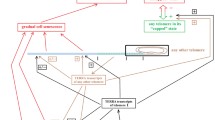Abstract
Telomeres protect the chromosome ends and maintain the genome stability; they, therefore, play important roles in aging and cancer. Despite the wide variability in telomere length among eukaryotes, in all telomerase-expressing cells telomere length is strictly controlled within a very narrow range. In humans, telomeres shorten with age, and it has been proposed that telomere shortening may play a causal role in aging. Using yeast strains with genetically or physiologically generated differences in telomere length, we have explored the question of whether having long telomeres affects telomere function and fitness or cellular lifespan. We found no effect of long telomeres on vegetative cell division, meiosis, or in cellular lifespan. No positive or negative effect on fitness was observed either under stressful conditions.
Similar content being viewed by others
References
Askree SH, Yehuda T, Smolikov S, Gurevich R, Hawk J, Coker C, Krauskopf A, Kupiec M, McEachern MJ (2004) A genome-wide screen for Saccharomyces cerevisiae deletion mutants that affect telomere length. Proc Natl Acad Sci USA 101:8658–8663. doi:10.1073/pnas.0401263101
Avilion AA, Piatyszek MA, Gupta J, Shay JW, Bacchetti S, Greider CW (1996) Human telomerase RNA and telomerase activity in immortal cell lines and tumor tissues. Cancer Res 56:645–650
Bakaysa SL, Mucci LA, Slagboom PE, Boomsma DI, McClearn GE, Johansson B, Pedersen NL (2007) Telomere length predicts survival independent of genetic influences. Aging Cell 6:769–774. doi:10.1111/j.1474-9726.2007.00340.x
Blasco MA (2005) Telomeres and human disease: ageing, cancer and beyond. Nat Rev Genet 6:611–622. doi:10.1038/nrg1656
Cowell JK, Miller OJ (1983) Occurrence and evolution of homogeneously staining regions may be due to breakage-fusion-bridge cycles following telomere loss. Chromosoma 88:216–221
de Lange T (2009) How telomeres solve the end-protection problem. Science 326:948–952. doi:10.1126/science.1170633
Gatbonton T, Imbesi M, Nelson M, Akey JM, Ruderfer DM, Kruglyak L, Simon JA, Bedalov A (2006) Telomere length as a quantitative trait: genome-wide survey and genetic mapping of telomere length-control genes in yeast. PLoS Genet 2:e35. doi:10.1371/journal.pgen.0020035
Harari Y, Kupiec M (2017) Long telomeres do not affect cellular fitness in yeast. mBio. doi:10.1128/mBio.01314-1710
Harley CB, Futcher AB, Greider CW (1990) Telomeres shorten during ageing of human fibroblasts. Nature 345:458–460
Hayflick L (1965) The limited in vitro lifetime of human diploid cell strains. Exp Cell Res 37:614–636
Jaskelioff M, Muller FL, Paik JH, Thomas E, Jiang S, Adams AC, Sahin E, Kost-Alimova M, Protopopov A, Cadinanos J, Horner JW, Maratos-Flier E, Depinho RA (2011) Telomerase reactivation reverses tissue degeneration in aged telomerase-deficient mice. Nature 469:102–106. doi:10.1038/nature09603
Lazzerini Denchi E, Celli G, de Lange T (2006) Hepatocytes with extensive telomere deprotection and fusion remain viable and regenerate liver mass through endoreduplication. Genes Dev 20:2648–2653. doi:10.1101/gad.1453606
Levy MZ, Allsopp RC, Futcher AB, Greider CW, Harley CB (1992) Telomere end-replication problem and cell aging. J Mol Biol 225:951–960
Li B, Lustig AJ (1996) A novel mechanism for telomere size control in Saccharomyces cerevisiae. Genes Dev 10:1310–1326
Matsuda T, Fujimura S, Suda H, Matsufuji Y, Nakagawa J (2011) Alteration of ethanol tolerance caused by the deficiency in the genes associated with histone deacetylase complex in budding yeast. Biosci Biotechnol Biochem 75:1829–1831. doi:10.1271/bbb.110232
Niida H, Matsumoto T, Satoh H, Shiwa M, Tokutake Y, Furuichi Y, Shinkai Y (1998) Severe growth defect in mouse cells lacking the telomerase RNA component. Nat Genet 19:203–206
Olovnikov AM (1973) A theory of marginotomy. The incomplete copying of template margin in enzymic synthesis of polynucleotides and biological significance of the phenomenon. J Theor Biol 41:181–190
Pickett HA, Cesare AJ, Johnston RL, Neumann AA, Reddel RR (2009) Control of telomere length by a trimming mechanism that involves generation of t-circles. EMBO J 28:799–809. doi:10.1038/emboj.2009.42
Romano GH, Harari Y, Yehuda T, Podhorzer A, Rubinstein L, Shamir R, Gottlieb A, Silberberg Y, Pe’er D, Ruppin E, Sharan R, Kupiec M (2013) Environmental stresses disrupt telomere length homeostasis. PLoS Genet 9:e1003721. doi:10.1371/journal.pgen.1003721
Satoh T, Nakatsuka D, Watanabe Y, Nagata I, Kikuchi H, Namura S (2000) Neuroprotection by MAPK/ERK kinase inhibition with U0126 against oxidative stress in a mouse neuronal cell line and rat primary cultured cortical neurons. Neurosci lett 288:163–166
Shachar R, Ungar L, Kupiec M, Ruppin E, Sharan R (2008) A systems-level approach to mapping the telomere length maintenance gene circuitry. Mol Syst Biol 4:172. doi:10.1038/msb.2008.13
Smogorzewska A, de Lange T (2004) Regulation of telomerase by telomeric proteins. Annu Rev Biochem 73:177–208
Stanley SE, Armanios M (2015) The short and long telomere syndromes: paired paradigms for molecular medicine. Curr Opin Genet Dev 33:1–9. doi:10.1016/j.gde.2015.06.004
Ungar L, Yosef N, Sela Y, Sharan R, Ruppin E, Kupiec M (2009) A genome-wide screen for essential yeast genes that affect telomere length maintenance. Nucleic Acids Res 37:3840–3849. doi:10.1093/nar/gkp259
Yamamoto Y, Izawa S (2013) Adaptive response in stress granule formation and bulk translational repression upon a combined stress of mild heat shock and mild ethanol stress in yeast. Genes Cells 18:974–984. doi:10.1111/gtc.12090
Yona AH, Manor YS, Herbst RH, Romano GH, Mitchell A, Kupiec M, Pilpel Y, Dahan O (2012) Chromosomal duplication is a transient evolutionary solution to stress. Proc Natl Acad Sci USA 109:21010–21015. doi:10.1073/pnas.1211150109
Yosef N, Kupiec M, Ruppin E, Sharan R (2009) A complex-centric view of protein network evolution. Nucleic Acids Res 37:e88. doi:10.1093/nar/gkp414
Acknowledgements
This work was supported by grants from the Israel Science Foundation, the Israel Cancer Research Fund, and the Israel Cancer Association. We thank all members of the Kupiec lab for support and encouragement.
Author information
Authors and Affiliations
Corresponding author
Additional information
Communicated by M. Kupiec.




